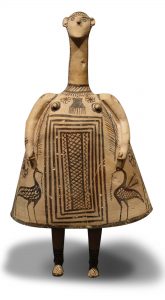Identifying Idols
 God takes idolatry very seriously. The first of the Ten Commandments—and they are given in order of priority—is about idolatry: “You shall have no other gods before me.” Nothing else should get pride of place in our lives. He alone deserves our highest devotion, he alone is of infinite worth, and he alone can provide us with the ultimate meaning we seek.
God takes idolatry very seriously. The first of the Ten Commandments—and they are given in order of priority—is about idolatry: “You shall have no other gods before me.” Nothing else should get pride of place in our lives. He alone deserves our highest devotion, he alone is of infinite worth, and he alone can provide us with the ultimate meaning we seek.
But our hearts are idol factories, as John Calvin wisely noted. You see, we are sinners—every one of us—and the root cause of sin is always idolatry. That is, we sin because we value some object more highly than God himself, even though he is the infinitely valuable One. We make something an idol when we attach ultimate value or meaning to something other than him, which is why even good things—marriage, family, achievement, ministry—can become idols if we are not vigilant.
If this is true, we need to pay exceedingly careful attention to our own patterns of idolatry. I will experience no victory over sin unless I see I am treasuring something above the love of Christ. What is it that I treasure more? Or, to put it another way, how can I identify my heart’s idols?
Here are six ways I have found helpful in pinpointing the root idols in our hearts.
- You are devastated if you lose it (or never get it). We all experience disappointment and grief when we lose something we treasure, and that is true even if we have not made an idol of it. I am speaking of something else though: an utter devastation—the feeling of being unmade or undone—at the loss of your greatest treasure. We would all feel fear, anger, disappointment at losing our job, for example, but if your self-regard is tied to your career (“I achieve, therefore I am”), then the loss of a job becomes something else entirely. You will soon plunge into despair, desperate because you’ve lost, not just a job, but your very self. (And you can experience this same devastation if you never get the idol you’ve been worshiping—never made partner, never have children, etc.)
- You are always dissatisfied in this area. No matter how much you get, you always want more—more money, more fame, more power, more pleasure. Your heart is like the leech’s two daughters crying, “Give! Give!” (Proverbs 30:15). Where do you see that you lack contentment? Dig deep enough, and you will undoubtedly find an idol at the core. Do you always want newer, nicer things? Look for idols of comfort, status, or security. Do you struggle with an addiction? Check for idols of pleasure and self-indulgence. Do you need another degree, another accolade, another promotion? Search for idols of success, approval, or achievement.
- You spend your time and/or money on it. Worship demands sacrifice, and we will gladly count that cost to get what we treasure most. Watch your spending habits—time and money—and see what patterns you discern. If you’re spending more time exercising than connecting with your family, I’d be concerned about the idol of health or appearance (and likely the deeper idols of security/control or love/acceptance). If you’re not giving sacrificially to support the work of God’s kingdom because you’re always on five-star vacations, I’d worry about the idols of comfort and self-indulgence.
- You are willing to sin to get it. This may seem like an obvious one, but it’s worth teasing out a bit. What sin habits have you formed in your life—and why? Do you find yourself gossiping time and again? You’re probably looking for status or acceptance, and the best way to get yourself in the inner ring is to get someone else out! Do you sit in self-righteous judgment of others? You’ve probably made an idol of your religious performance. Are you in a sexually illicit relationship, or willing to date someone who doesn’t share your religious convictions? There’s a good bet you’re worshiping the idol of human love—marriage, sex, a sense of belonging. Are you a bully, trampling on people in meeting after meeting? I’d check for the idol of power.
- Your emotions spike in this area. You don’t just feel happy; you feel elated when that person compliments or affirms you (acceptance, approval). You don’t have a good time; you have a great time when you’re chasing that hobby (comfort, pleasure). You don’t feel hurt; you feel crushed when you receive criticism at work (achievement, success). This is a bit more subjective—some of us feel more deeply than others, many factors contribute to our emotional state, and so forth—but if you see patterns of extreme emotional highs and lows, I’d start asking the hard questions.
- You can’t help but mention it—right away. Pay attention to what information you want to make sure people know about you early on. When you first meet someone, how do you introduce yourself? If you’ve listed all your degrees, titles, and credentials by the sixth sentence, for example, I’d check for the idol of status or achievement. This can be subtle, by the way. I knew an older woman who always shared about her singleness when introducing herself, usually right after giving her name. It may have been her approach to her biography, but it may have inadvertently revealed a hidden idol of love (marriage, family, romance, belonging).
Those are some of the ways I have identified the root idols in my own desperately sinful heart.
What are some other ways you’ve used to help you identify idols in your life?
